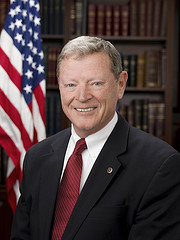 U.S. Sen. Jim Inhofe (R-Okla.), a member of the Senate General Aviation Caucus and certified flight instructor with more than 11,000 hours, has released the outline for the Pilot’s Bill of Rights 2 (PBOR2) and is asking the aviation community to submit comments for the final Senate legislation.
U.S. Sen. Jim Inhofe (R-Okla.), a member of the Senate General Aviation Caucus and certified flight instructor with more than 11,000 hours, has released the outline for the Pilot’s Bill of Rights 2 (PBOR2) and is asking the aviation community to submit comments for the final Senate legislation.
“The goal of Pilot’s Bill of Rights 2 is to continue addressing unfair practices and regulations toward the aviation industry. Today I unveiled my draft legislation for how to accomplish this goal, and I am also requesting feedback from the aviation community on how this legislation can best meet their needs and ensure a safe and innovative industry that is free of heavy-handed bureaucracy.
“The following is a section-by-section summary of PBOR2 draft:
Section 1 – Title. Pilot’s Bill of Rights 2
Section 2 – Language expands the FAA’s 3rd class medical exemption for light sport aircraft to cover most small general aviation (GA) aircraft. It would also prohibit enforcement of violations if FAA has not complied with these provisions within 180 days of enactment.
Section 3 – Language reigns in Customs and Border Patrol (CBP) stops and searches of GA by requiring CBP to follow general law enforcement standards when exercising its powers.
Section 4 – Language provides local airport offices to manage the use of private hangars at airports. Current law gives federal officials and Washington the ability to dictate what does and doesn’t happen inside a hangar; this section changes that problem.
Section 5 – Opens a dialogue on language that will make it easier to install new, safety enhancing equipment on existing aircraft without going through a lengthy, expensive certification process.
Section 6 – Language expands on the Pilot’s Bill of Rights by:
Subsections a-b. – Explicitly states that pilots facing an investigation by FAA can appeal the issue directly to a federal district court for a de novo trial. This provision of the original Pilot’s Bill of Rights has not operated as intended.
Subsection c. – Expands the protections of the Pilot’s Bill of Rights to other certificate holders in the aviation community, such as charter operators or repair stations.
Subsection d. – Requires FAA to provide notification to an individual once they become subject to an FAA investigation; if FAA does not provide notification, they cannot press charges.
Subsection e. – Limits scope of FAA’s document requests of certificate holders to the pertinent issues being investigated.
Subsection f. – Reinstates FAA’s expungement policy, preventing the agency from retaining records of enforcement against an airmen certificate holder after retaining it for 5 years. Also prohibits the retention of records beyond 90 days if the agency does not take enforcement action. Further prevents the FAA from publicizing pending enforcement actions against a covered certificate holder.
Section 7 – Prohibits enforcement of NOTAM violations if FAA has not finished its NOTAM improvement program by the end of the year.
Section 8 – Language requires contract towers and other outsourced FAA programs to be subject to FOIA requests.
Section 9 – Language provides civil liability protection to aviation medical examiners and other FAA reps, treating them as government employees as the proscribed duties are carried out.
A copy of the draft text as of June 30 can be viewed by clicking here.
On Aug. 3, 2012, Inhofe Pilot’s Bill of Rights (S.1335) was signed into law, which made FAA enforcement proceedings and NTSB review fair for pilots; streamlined the NOTAM Improvement Program; and required a GAO review of the FAA’s medical certification process and forms in order to help bring clarity and reduce instances of misinterpretation with medical forms for pilots.
The legislation garnered 65 Senate cosponsors and the endorsement of pilot and actor Harrison Ford.
